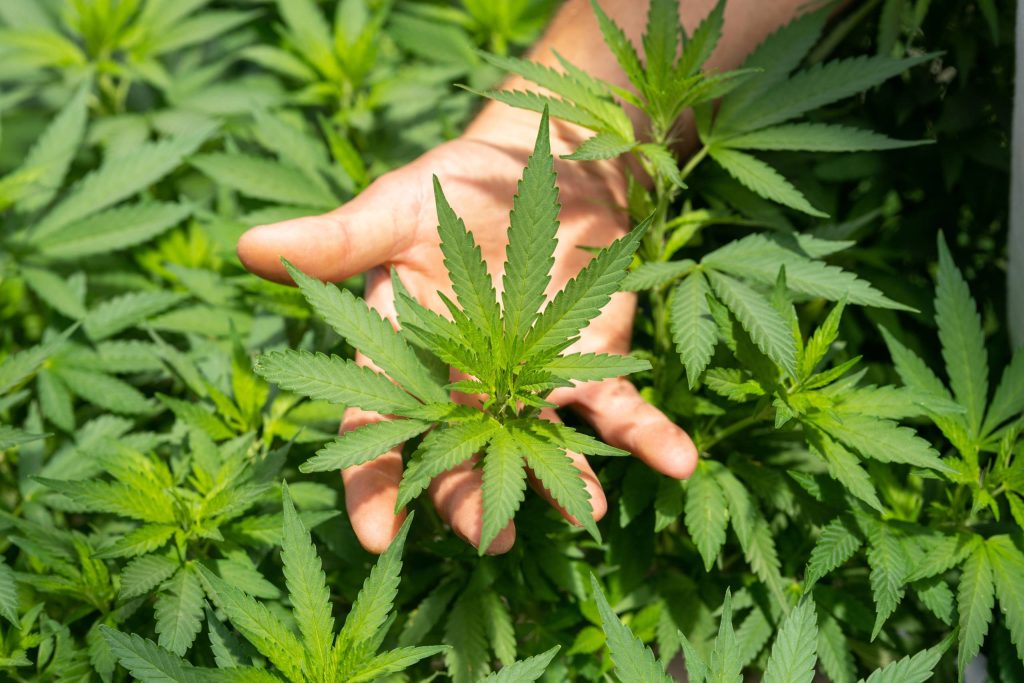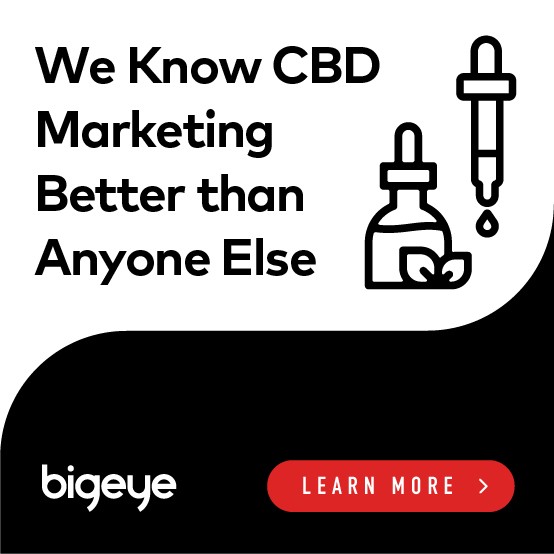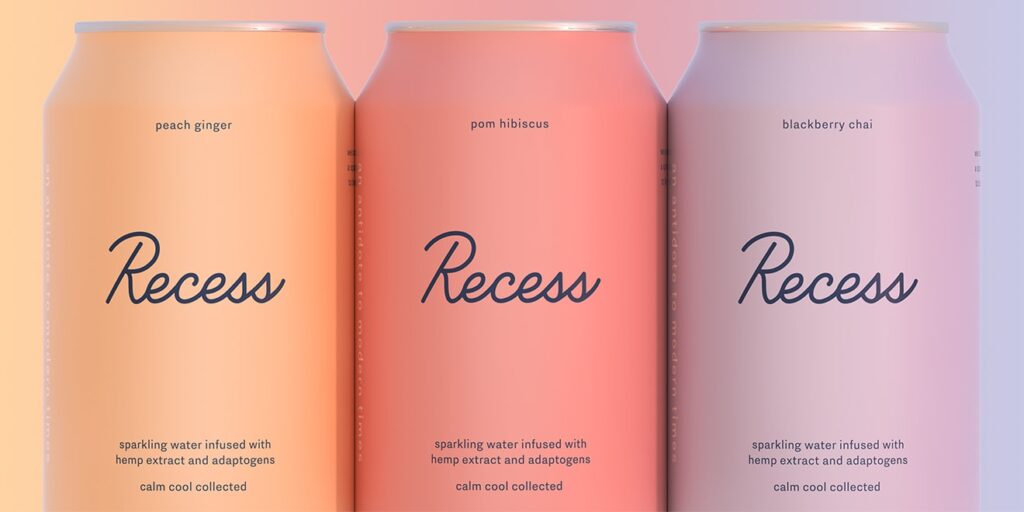
A report by Bigeye, an Audience-Focused, Creative-Driven, Full-Service Advertising Agency devoted to creating CBD marketing campaigns that drive conversions.
The Quick-Takes
- Millennial women are the most avid CBD fans — and they desire products formulated and sold in a certain way.
- Follow the lead of caffeine and market a feeling, not an ingredient (think energy drinks).
- Half of Americans think CBD and cannabis are the same thing, so transparency, education and trust in CBD advertising is essential.
- Regulations are moving quickly. Pressure is building for national CBD advertising standards as restrictions are slowly slackening.
- Smart marketers can sidestep these restrictions by advertising on podcasts and other CBD-friendly channels.
- Most CBD marketing is yawn-inducing. If you want to engage audiences, you need to be bold. Tap into the Zeitgeist by taking what people fear and dislike about the modern world and position your product as an antidote.
- Bigeye understands the CBD marketing space in a way that your current agency can’t equal. Don’t believe it? Read on…
CBD is 2021’s Breakout Product
Not only are CBD products flying off retail shelves everywhere, the product has ignited a firestorm of cultural conversation and consumer interest.
If you’re in the CBD advertising business, that’s great news — you’ve got a product that sells itself in many ways. Yet here’s the rub: with rapid growth comes stiff competition. Everyone sees the generational opportunity that hemp-derived products like CBD represent, and they are rushing in to carve out market share.
In order to help you flourish in a crowded space, you need to understand the challenges inherent to CBD marketing, while keeping abreast of all changes in this fast-evolving market.
Let’s take a closer look at some key aspects of CBD advertising and CBD product marketing that you may not have fully considered.

CBD Marketing and Advertising Tips for 2021 and Beyond
There are nearly 4,000 brands within the CBD space in the United States. Given that kind of competition, it’s essential to develop a sophisticated marketing strategy and execute flawlessly. Let’s take a closer look at some tips CBD marketers can follow when creating their next campaign:
- Differentiate your products through branding. Let’s be honest: There is often very little to differentiate CBD products. Oils, gummies and tinctures are…oils, gummies and tinctures. Differentiation, therefore, needs to occur through branding. Many CBD enterprises have chosen to target the health and wellness market, pitching CBD products as lifestyle enhancers that can help consumers deal with pain, anxiety, insomnia etc. in a natural way. This is a powerful argument, as there is a considerable backlash within society at the moment with regard to overprescription of pharmaceuticals. By pitching your product as an all natural, healthy way to treat common ailments, marketers can target those who use pharmaceuticals while activating a vast market of people who are healthy, but are seeking to use CBD as a life optimization product.
- Know your true audience. If we asked you which kind of person has the most interest in CBD, would you say a millennial woman? If not, then your marketing may be off-target. According to a new research report, CBD products hold more attraction for women than men — and women generally prefer “softer” CBD products (such as gummies, infused beverages, beauty products etc.) while men prefer “harder” CBD products such as concentrates, vapes and tinctures. Across all genders, millennials exhibit more interest than any other demographic group, and they are particularly focused on CBD in the wellness context.
- Market a feeling, not a product. Given the relatively faceless nature of CBD brands and uniformity of the products they sell, smart marketers should remember that they are marketing a feeling as much as anything else. What does this mean in practical terms? Think about caffeine — nobody markets caffeine directly, although it is consumed in enormous quantities. Instead, companies market the feeling it produces: energy. Brands built an entire product category out of feeling-oriented marketing (energy drinks). Alcohol companies, meanwhile, have build campaign after campaign centered around the social aspects of beer and wine.
- Focus on trust and transparency in CBD marketing. One of the most significant reasons why people fail to try CBD is because of fear or skepticism about the effects of CBD on the body and the product quality and/or supply chain. This is largely borne from ignorance. Despite its surging popularity, research shows that 60% of people don’t know what CBD is and don’t understand its effects. When a product is this widely unknown — and is also linked closely with psychoactive compounds — it’s hardly surprising that some people are hesitant to put this substance into their bodies. In order to overcome this reticence, CBD product marketing should emphasize trust and transparency with regard to CBD sourcing.
- Tap the emerging markets. CBD is making waves in a variety of industries, but it is gaining particular traction within the pet industry. Why? The first reason is simple: Dogs suffer from many of the same maladies as their owners, and CBD’s clinical effects can help them manage these symptoms. Second, today’s pet owners are willing to pay almost any premium to provide their animals with the best possible lives — just look at the growth in grain-free dog food.
Even though science shows that grain-free dog food might be worse for animals than conventional dog food, people buy it anyway because of the general bias against gluten and the fact that it sounds healthier. CBD-infused pet products, however, have been met with positive anecdotal reports and are selling at a brisk clip. In fact, CBD pet products are the fastest growing category within that industry. The beauty industry is also witnessing exceptional sales growth within the CBD category, as consumers seek natural skin treatments. - Stay on the right side of regulators. The FDA is busy sending out warning letters to CBD companies that skirt the rules of legal marketing. According to a recent release, the FDA is cracking down on companies that illegally sell “unapproved products containing cannabidiol online with unsubstantiated claims that the products treat teething pain and ear aches in infants, autism, attention-deficit/hyperactivity disorder (ADHD), as well as Parkinson’s and Alzheimer’s disease, among other conditions or diseases.”
Given CBD’s clinically established success in treating a variety of significant illnesses, it seems foolhardy to stretch the truth by making unsupported assertions. Not only can you quickly run afoul of FDA regulators, such unethical practices make all firms within the CBD market tainted by association. - Consider the FTC as well as the FDA. Additionally, the FDA isn’t the only controlling body that needs to be accounted for. The Federal Trade Commission has its own standard, which makes it “unlawful to advertise that a product can prevent, treat, or cure human disease unless the advertiser possesses competent and reliable scientific evidence, including, when appropriate, well-controlled human clinical studies, substantiating that the claims are true at the time they are made.” That’s a reasonably high bar — and one that all CBD marketers should be familiar with.
- Counter widespread misunderstandings. Marketers aren’t immune to the “Curse of Knowledge.” We often get so close to the industry in which we operate that we have a hard time understanding that most people lack even glancing familiarity with the products and services we know so well. In the case of CBD, you may be shocked to learn just how much bad information is circulating.
According to new research from the Grocery Manufacturer’s Association, 40% of Americans believe CBD is another name for cannabis. Roughly 51% of Americans believe taking CBD will get them high. Approximately 76% of Americans believe CBD is fully regulated at the federal level. Wrong, wrong and wrong. While the FDA is enforcing CBD ad violations, it is working under outdated statutes governing supplements. There is no CBD-specific set of federal guidelines governing the sale and marketing of CBD. Marketers need to understand just how limited the understanding of CBD is among the general public and take steps to help people learn. - Go against the grain. This is advice we’d give to brands in almost any industry, but we think it applies with special emphasis within the CBD product category. The CBD category is driven largely by millennial and Gen Z consumers, all of whom have grown up in an environment where advertising, whether in hard or soft form, is pervasive. As such, routine campaigns often don’t resonate.
Cliched 4/20 style product packaging or sedate-and-yawn-inducing wellness branding probably won’t move the needle very far. There are two ways you can avoid falling into this trap: Come up with strikingly original copy and visuals, or tie your marketing into the larger concerns and obsessions of millennials and Gen Z consumers. By this, we don’t simply mean pumping out low quality memes on social media. - Get creative. One of our favorite examples of this type of marketing in the CBD space comes from Recess, a CBD beverage brand. The company brands its products as “an antidote to modern times,” tapping into millennial and Gen Z angst about the state of the world they are inheriting. The brand’s narrative is “the world has gone crazy and we all need a recess.” This works because it taps into a widely shared feeling; it’s pulled directly from the millennial Zeitgeist. As such, it’s very powerful. Recess makes this CBD marketing strategy even more potent by using surrealistic designs on its beverage cans. Their cans are personified, dressed in office suits and shown staring wistfully outside windows. It’s a brilliant strategy — but it’s also a strategy that can only be developed by a brand or CBD marketing agency with real creative skill and industry insight.

Creating Effective Digital Marketing in an Often CBD-Unfriendly World
Due to its connection to cannabis and hemp, CBD products have faced significant restrictions in terms of digital marketing. Facebook and Google, who dominate the digital ad space, both made advertising CBD products on their properties verboten. If you run a CBD marketing agency or a brand, this obviously ties your hands and you need to understand the rules for advertising CBD on social media.
Fortunately, times are changing. Facebook has recently loosened its CBD advertising rules, and will now allow a narrow category of digital CBD ads. As CBD grows more mainstream (and becomes fully legal in all state jurisdictions) it’s very likely that restrictions on Facebook and Instagram will be lifted entirely. After all, that’s a very large pot of ad revenue Facebook is forgoing. Snapchat, meanwhile, takes a somewhat more liberal approach to CBD ads, and as a result is one of the most effective social platforms for CBD ads.
Alternative Digital Marketing Options
CBD ads have also faced some resistance from major digital publishers, who have banned CBD product marketing from some of their most popular websites. Third party marketing platforms specially designed for the cannabis and CBD markets have been created to help brands create an effective CBD marketing strategy for the digital channel. These platforms use technology that automatically verifies the ages of browsers and the states in which they are located in order to ensure they remain compliant with all relevant regulations. This is one clever approach that can help CBD brands negotiate the tricky task of staying compliant, while gaining critical access to high authority publishers such as Buzzfeed and USA Today.
Thought Leadership and Education
If direct digital marketing is still largely unavailable, there are some alternate paths for a CBD brand or CBD marketing company to take. One example: Thought leadership and education pieces. These do not fall under the direct advertising designation and there is considerable public appetite for educational content. The CBD space, while growing quickly, is still something of a blank slate to most consumers. Providing them with high-quality educational content is an excellent way to turn “CBD curious consumers” into loyal customers.
Sponsored Content
It’s also important to remember that many publishers and ad platforms do not have these restrictions and are, in fact, happily courting the CBD market. FieldTest is one such platform. The company has negotiated agreements with high level publishers across the Internet to host CBD display ads. Sponsored content/native advertising placed on third-party websites is another path that can be taken, although many of these programs have the same type of limitations in place.
Influencer Marketing
It’s also important to avoid looking the past the value of influencer marketing. In just four years, influencer marketing has grown from a $1.7 billion enterprise to a nearly $7 billion market. Google searches for “influencer marketing” grew by an astonishing 1,500% over the same period. Instagram alone is well on its way to two billion daily users.
Influencers on that platform and others are not subject to the same restrictions found within conventional CBD digital marketing, which makes them a valuable commodity for brands seeking digital traction. Partnering with the right influencers, however, is key. Raw numbers don’t tell the whole story in terms of reach or influence. It’s better to find an influencer with 10k highly engaged followers than partner with someone who has collected (or even purchased) 100k largely random followers.
Podcast Ads
CBD brands can also take a more unorthodox approach and pursue something like podcast advertising. Growth in the podcast market has been exceptional in recent years, and CBD brands are a natural fit for the podcast demographic. While many people are under the mistaken impression that most podcasts are little more than a couple of people in a basement studio, the top podcasts generate millions of listens and downloads. By choosing podcasts with a strong following (and an audience that overlaps in some sense with CBD buyers), a brand or CBD marketing company can generate a surprisingly high ROI.
Finally, affiliate marketing services such as ClickBank offer another avenue into digital marketing for CBD brands.
Creating High-Level CBD Marketing and Advertising with Bigeye
If your CBD marketing campaigns aren’t resonating, it’s time for a switch. At Bigeye, we believe that real results come only when you find a creatively dynamic partner with true domain expertise.
That’s what we offer our clients. We’ve been working in the CBD space almost since its inception; we’re no late entrant into the field, seeking to capitalize on the latest trend. We keep our pulse on what’s happening in the CBD industry, and we’re always one step ahead of evolving regulations and industry standards. Using that expertise, we create highly compelling CBD campaigns and pair them with the ideal distribution strategy, ensuring that your messages are served to the most relevant audiences possible.
If you’re looking for a creatively inspired CBD marketing campaign that engages audiences on a deeper level and gets them to convert, we urge you to reach out to Bigeye today. We’d love to show you the power of a creatively inspired, tech-supported CBD ad strategy.
Want to learn more about the CBD consumer? Download our National Study of CBD Use.



